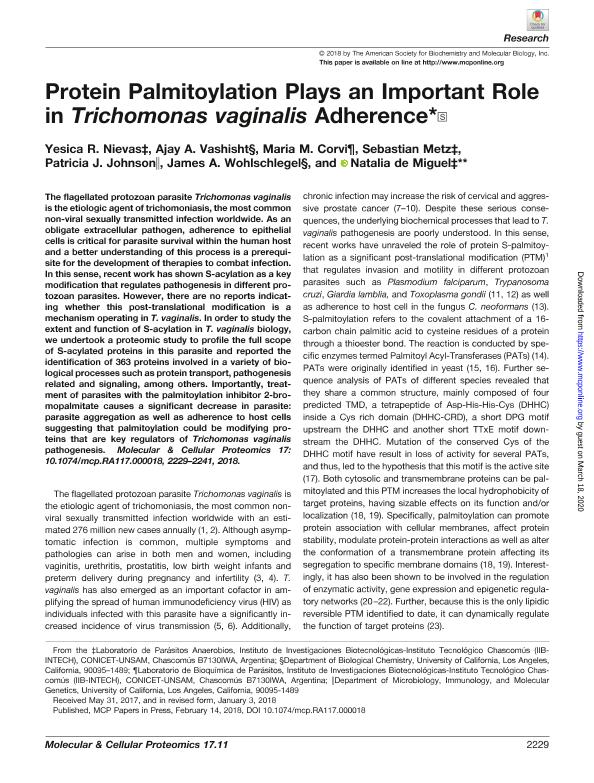Artículo
Protein palmitoylation plays an important role in Trichomonas vaginalis adherence
Nievas, Yésica Romina ; Vashisht, Ajay A.; Corvi, Maria Martha
; Vashisht, Ajay A.; Corvi, Maria Martha ; Metz, Sebastián Darío
; Metz, Sebastián Darío ; Johnson, Patricia J; Wohlschlegel, James A.; de Miguel, Natalia
; Johnson, Patricia J; Wohlschlegel, James A.; de Miguel, Natalia
 ; Vashisht, Ajay A.; Corvi, Maria Martha
; Vashisht, Ajay A.; Corvi, Maria Martha ; Metz, Sebastián Darío
; Metz, Sebastián Darío ; Johnson, Patricia J; Wohlschlegel, James A.; de Miguel, Natalia
; Johnson, Patricia J; Wohlschlegel, James A.; de Miguel, Natalia
Fecha de publicación:
11/2018
Editorial:
American Society for Biochemistry and Molecular Biology
Revista:
Molecular & Cellular Proteomics
ISSN:
1535-9476
Idioma:
Inglés
Tipo de recurso:
Artículo publicado
Clasificación temática:
Resumen
The flagellated protozoan parasite Trichomonas vaginalis is the etiologic agent of trichomoniasis, the most common non-viral sexually transmitted infection worldwide. As an obligate extracellular pathogen, adherence to epithelial cells is critical for parasite survival within the human host and a better understanding of this process is a prerequisite for the development of therapies to combat infection. In this sense, recent work has shown S-acylation as a key modification that regulates pathogenesis in different protozoan parasites. However, there are no reports indicating whether this post-translational modification is a mechanism operating in T. vaginalis. In order to study the extent and function of S-acylation in T. vaginalis biology, we undertook a proteomic study to profile the full scope of S-acylated proteins in this parasite and reported the identification of 363 proteins involved in a variety of biological processes such as protein transport, pathogenesis related and signaling, among others. Importantly, treatment of parasites with the palmitoylation inhibitor 2-bromopalmitate causes a significant decrease in parasite: Parasite aggregation as well as adherence to host cells suggesting that palmitoylation could be modifying proteins that are key regulators of Trichomonas vaginalis pathogenesis.
Palabras clave:
CELL ADHESION
,
HOST-PATHOGEN INTERACTION
,
PALMITOILATION
,
PARASITE
Archivos asociados
Licencia
Identificadores
Colecciones
Articulos(CCT - LA PLATA)
Articulos de CTRO.CIENTIFICO TECNOL.CONICET - LA PLATA
Articulos de CTRO.CIENTIFICO TECNOL.CONICET - LA PLATA
Articulos(IIB-INTECH)
Articulos de INST.DE INVEST.BIOTECNOLOGICAS - INSTITUTO TECNOLOGICO CHASCOMUS
Articulos de INST.DE INVEST.BIOTECNOLOGICAS - INSTITUTO TECNOLOGICO CHASCOMUS
Citación
Nievas, Yésica Romina; Vashisht, Ajay A.; Corvi, Maria Martha; Metz, Sebastián Darío; Johnson, Patricia J; et al.; Protein palmitoylation plays an important role in Trichomonas vaginalis adherence; American Society for Biochemistry and Molecular Biology; Molecular & Cellular Proteomics; 17; 11; 11-2018; 2229-2241
Compartir
Altmétricas



